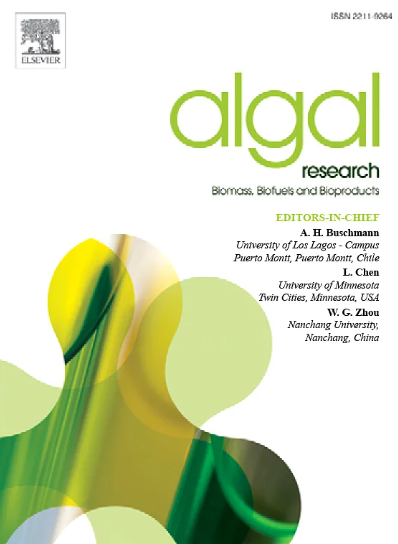Developing productivity and susceptibility attributes towards a rapid management-risk assessment of seaweed
IF 4.6
2区 生物学
Q1 BIOTECHNOLOGY & APPLIED MICROBIOLOGY
Algal Research-Biomass Biofuels and Bioproducts
Pub Date : 2025-06-17
DOI:10.1016/j.algal.2025.104160
引用次数: 0
Abstract
The challenge of balancing conservation with sustainable use of marine resources faced by fisheries managers is quite often constrained by limited data on key species. This has become particularly true in the case of seaweed, which provide essential habitats for a diverse range of species in marine ecosystems and have long been valued by humans as food or, more recently, for their industrial applications. The expanding seaweed industry relies heavily on harvesting but historical declines in seaweed populations raise concerns over sustainability, leveraged by a general data-poor scenario for these species. To address this, we propose adapting the Productivity and Susceptibility Analysis (PSA) method—traditionally used in fishery assessments—for seaweeds. This novel approach incorporates the unique biology of seaweeds, including growth, reproduction, and susceptibility to environmental changes and harvesting practices, to evaluate their vulnerability. We applied this adapted PSA framework to a case study of seaweed harvesting in the Azores Archipelago, mid-north Atlantic, demonstrating its applicability in future science-based seaweed fisheries management srtategies. Among the 18 species studied, we identified five of high vulnerability (Cystoseira pustulata, Fucus spiralis, Gongolaria abies-marina, Laminaria ochroleuca, and Ericaria selaginoides). Our adapted PSA framework also considers local ecological impacts, stakeholder input, and relevant environmental factors, providing targeted management recommendations. While such a PSA does not replace stock assessments, it serves as a valuable risk assessment tool, identifying species needing greater management attention despite data limitations. Ultimately, this framework supports local, national and international policy and management measures, contributing to the conservation of coastal marine ecosystems.
开发生产力和敏感性属性,以实现对海藻的快速管理风险评估
渔业管理人员在平衡养护与可持续利用海洋资源方面面临的挑战往往受到关键物种数据有限的限制。对于海藻来说尤其如此,海藻为海洋生态系统中各种物种提供了必不可少的栖息地,长期以来一直被人类视为食物或最近的工业应用。不断扩大的海藻产业在很大程度上依赖于收获,但由于这些物种普遍缺乏数据,历史上海藻数量的下降引起了人们对可持续性的担忧。为了解决这个问题,我们建议采用生产力和敏感性分析(PSA)方法-传统上用于渔业评估-用于海藻。这种新颖的方法结合了海藻独特的生物学特性,包括生长、繁殖、对环境变化的敏感性和收获方式,来评估它们的脆弱性。我们将这一调整后的PSA框架应用于北大西洋中部亚速尔群岛的海藻收获案例研究,证明了其在未来基于科学的海藻渔业管理策略中的适用性。在研究的18种植物中,鉴定出5种高度易感物种(肉芽囊藻、螺旋藻、褐藻、水藻和卷叶卷藻)。我们改编的PSA框架还考虑了当地的生态影响、利益相关者的投入和相关的环境因素,提供了有针对性的管理建议。虽然这种PSA不能取代种群评估,但它是一种有价值的风险评估工具,可以在数据有限的情况下确定需要更多管理关注的物种。最终,该框架支持地方、国家和国际政策和管理措施,有助于沿海海洋生态系统的保护。
本文章由计算机程序翻译,如有差异,请以英文原文为准。
求助全文
约1分钟内获得全文
求助全文
来源期刊

Algal Research-Biomass Biofuels and Bioproducts
BIOTECHNOLOGY & APPLIED MICROBIOLOGY-
CiteScore
9.40
自引率
7.80%
发文量
332
期刊介绍:
Algal Research is an international phycology journal covering all areas of emerging technologies in algae biology, biomass production, cultivation, harvesting, extraction, bioproducts, biorefinery, engineering, and econometrics. Algae is defined to include cyanobacteria, microalgae, and protists and symbionts of interest in biotechnology. The journal publishes original research and reviews for the following scope: algal biology, including but not exclusive to: phylogeny, biodiversity, molecular traits, metabolic regulation, and genetic engineering, algal cultivation, e.g. phototrophic systems, heterotrophic systems, and mixotrophic systems, algal harvesting and extraction systems, biotechnology to convert algal biomass and components into biofuels and bioproducts, e.g., nutraceuticals, pharmaceuticals, animal feed, plastics, etc. algal products and their economic assessment
 求助内容:
求助内容: 应助结果提醒方式:
应助结果提醒方式:


